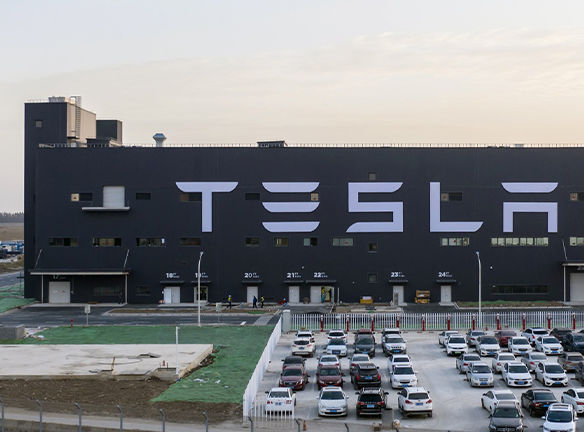Stock Market Overview:
Stocks remained relatively unchanged on Friday and for the week as investors evaluated the start of quarterly earnings reports and conflicting economic data to determine if an economic slowdown is forthcoming. During the early stages of the first-quarter earnings season, the S&P 500 demonstrated stability, which investors expect will deliver mediocre results. The upcoming week will bring a surge of earnings reports from megacap companies such as Microsoft, Amazon, and Alphabet, which have contributed to the S&P's success this year. The Dow Jones experienced a 0.3% decline, ending a four-week streak of gains, while the S&P 500 slightly decreased by 0.1%, and the Nasdaq experienced a 0.4% loss for the week.
News:
Tesla: Tesla's shares fell by over 11% after the company's first-quarter earnings results were published. The company's revenue for Q1 reached $23.33bn, beating Refinitiv estimates by $120m, but net income fell 24% year-on-year to $2.51bn. The company's core automotive revenue was $19.96bn, up 18% from last year. Interestingly Tesla Energy revenue soared to $1.53 billion, up 148% compared with the same period last year. CEO Elon Musk expressed caution about the economy, saying that uncertainty in the economy would generally cause people to postpone purchases of capital goods like cars. Musk said Tesla would concentrate on volume rather than higher margins, but significant profits expected in the future from autonomous vehicles. In the earnings call, Musk said the company is producing "alpha versions" of its Cybertruck on a pilot line and is preparing to produce the vehicle in Austin, Texas, with deliveries scheduled to start in Q3 2023. Tesla expects to produce 1.8 million vehicles in 2023, with an "upside" volume of two million vehicles this year. Even though TSLA shares have fallen more than 11% during the last week, the stock is still up 52% in 2023.
Netflix:
Netflix: Q1 2023 earnings report showed the company added 1.75 million subscribers, beating analyst estimates, but down 77% from the previous quarter. The company's financials met expectations, with profits of $1.31 billion exceeding estimates by a slight margin, while revenue fell slightly short at $8.16 billion. Netflix's Q2 profit forecast of $2.84 per share missed estimates of $3.07, and the company declined to provide guidance for subscriber expectations for the first time. The lackluster forecast and declining subscriber growth caused Netflix's shares to slide, with an initial drop of up to 10% in after-hours trading before partially recovering to a 4% loss by 4:30 pm. Netflix introduced several changes to its flagship service to address the surprise subscriber losses in 2022, including launching a less expensive ad-supported membership tier and initiating measures to crack down on account sharing. Analysts are closely watching the impact of the password sharing crackdown on Netflix's top and bottom lines, with Bank of America estimating that the actions will result in around $1.5 billion in added annual revenue for the company. Despite the Q1 results, however, Netflix's stock remains one of the best performing on the S&P 500 since May 2022, with shares still down over 50% from its November 2021 peak, compared to a 10% dip for the S&P.
Apple:
Apple has officially opened its first company-owned store in India in a bid to accelerate sales growth and diversify its manufacturing footprint beyond China. The store launch comes after years of meeting regulators' demands, including sourcing some of the products locally, and highlights the growing importance of the Indian market, with Apple's sales in the country reaching almost $6bn in the year through March. The company is targeting India's expanding middle class as an attractive opportunity, with Apple's sales in India predicted to reach $30bn by 2032, compared to around $6bn at the end of 2022. Cheaper local brands as well as Chinese and South Korean manufacturers have found more buyers among cost-conscious shoppers in the country, with only 4% of India's nearly 700 million smartphone users owning an iPhone. The retail push coincides with Apple's expanding local manufacturing as it seeks to reduce its reliance on China amid escalating tensions between the US and China.
This week’s ETF.
SCHD is an ETF (Exchange Traded Fund) offered by Charles Schwab that seeks to track the performance of the Dow Jones U.S. Dividend 100 Index, which comprises high dividend-paying U.S. stocks. The fund's holdings are generally blue-chip companies with a history of paying dividends consistently, and it tends to have a bias towards large-cap stocks. The fund's methodology focuses on selecting stocks that have a record of consistently paying dividends over time and that exhibit financial strength and stability. Additionally, the fund seeks to avoid companies with high payout ratios or that have unsustainable dividends. Overall, SCHD offers investors exposure to high-quality dividend-paying stocks with a track record of stability and consistent payouts. ETF has a dividend yield of approximately 3.6%, and an average yearly dividend growth rate of more than 11%.
